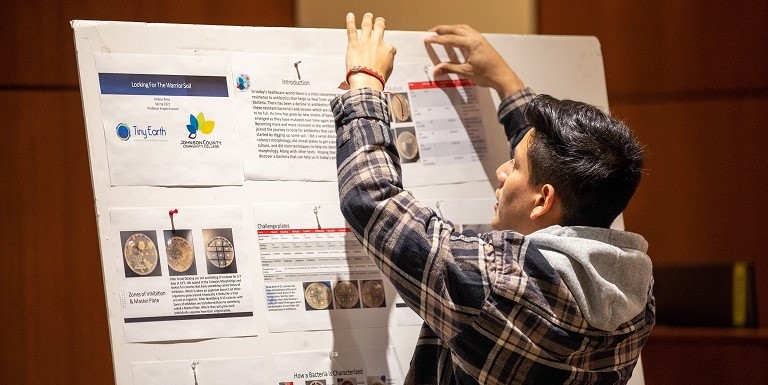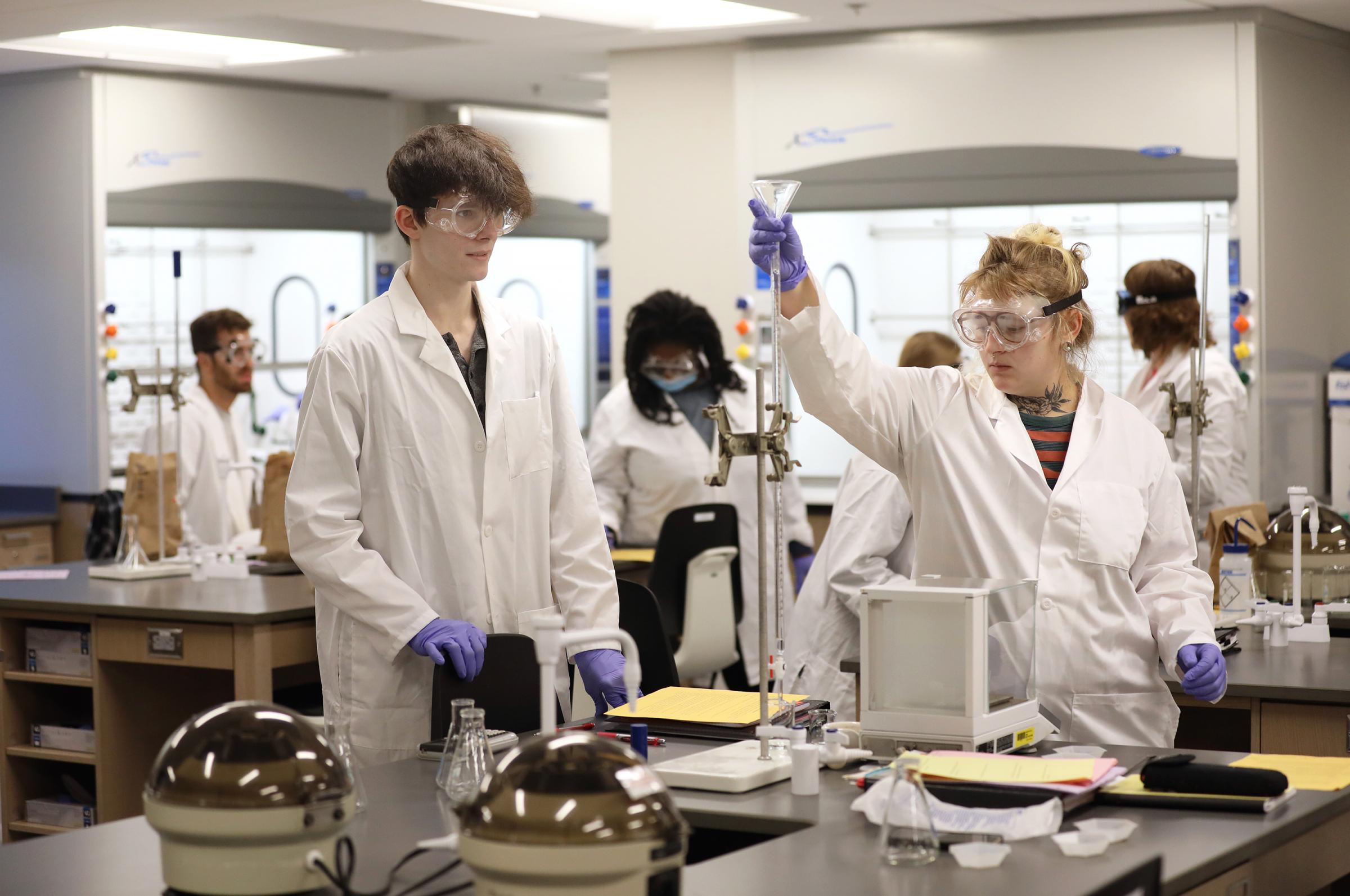Reimagining Undergraduate Research and Labs Where the Work Happens

There’s an old saying: What a difference a day makes. But what could a forward-looking institution do with 730 of them that could make a unique, positive difference in their students’ classroom experiences? That was the challenge faced by the leadership team at Johnson County Community College (JCCC) in 2020. In a meeting with newly hired President Andy Bowne, the team discussed the college’s next steps on a key initiative started by the previous president: demonstrating the college’s commitment to undergraduate research and STEM preparation for its students.
JCCC’s highly credentialed professors were keen on taking the necessary steps to better prepare students for advanced research opportunities at the four-year level. However, the classroom lab facilities to support this grand plan were lacking. After securing the support of Bowne and the board of trustees on what would prove to be a significant investment in student-facing facility upgrades on campus, academic leaders presented an idea that had proven successful during the building of the college’s Fine Arts and Design Studios a year prior: Why not have faculty members directly involved in helping design the space in which they would be doing this new work?
What followed was a six-month period of in-depth campus discussion. The project was initially slated to take five years. Dean Mary Wisgirda, newly hired to lead the Mathematics and Sciences Division, was tasked with paring down the timeline and potential campus disruptions. She was also called on to work with the Office of Academic Affairs to establish a process to gain faculty input on what improvements were needed in classrooms, labs, and research facilities. Wisgirda worked with PGAV Architects to plan an ambitious two-year timeline to overhaul the two primary laboratory buildings on the JCCC campus and redistribute and right-size the programs within them.

Chemistry students at JCCC are participating in Course-Based Undergraduate
Research Experiences (CUREs) in newly renovated laboratories.
Form Follows Function at JCCC
Groups of science faculty members were assigned to create unique environments in specific buildings that would give students opportunities to gain skills and engage with faculty for state-of-the-art training. PGAV Architects met with the faculty groups representing astronomy, biology, and chemistry, laying out what they had seen as impressive innovations in prior projects. They coupled that with faculty’s space and equipment requirements. This collaboration set the stage for implementing a means to give students the kind of experiences with modern equipment used to support a laboratory career or to transfer to a baccalaureate institution.
Faculty engagement was impressive. Many faculty scientists spent time during summer breaks researching desired enhancements to the learning environment. As neither the science building nor the classroom laboratory building had been significantly updated since they were built, what the faculty were envisioning took on a life of its own. Faculty, who wanted research projects to have an increased role in JCCC’s science offerings, planned how to borrow and scale ideas from the college’s Science and Math Poster Symposium, which began in 2017 and had evolved into the JCCC STEM Poster Symposium. New course delivery goals, where STEM students conduct their own research projects and present their work at a conference-style poster session that includes judging and awards, were developed. The opportunity to bring Course-Based Undergraduate Research Experience (CURE) pedagogy to JCCC’s science curricula was within reach.
Adopting CURE started to take shape among several faculty members in 2022 and has been incorporated within select microbiology and chemistry course curricula. With the partial completion of classroom renovations and the completion of the first set of students’ course-based research, JCCC’s inaugural CURE Symposium took place in fall 2022. Students who pushed the boundaries of what scientific inquiry could be at the community college level presented their work on such issues as antibodies derived from soil and other samples to create vaccines for common diseases. Other research was carried out in newly designed undergraduate research labs, which were added to the primary teaching facilities on the campus to allow students to pursue projects independently under the supervision of interested professors.
CURE at JCCC
Student research or projects may be from any JCCC course that uses CURE. CURE differs from traditional inquiry courses in the following ways (CUREnet, n.d.):
- Students have opportunities to make discoveries that interest stakeholders
outside the classroom and share their results with the broader scientific community. - Students can engage in a range of science practices, including collecting and analyzing data, building and defending arguments, and collaborating with one another and more experienced scientists.
- The work is iterative: Students must troubleshoot, problem-solve, and repeat aspects of their work for the research to progress.
- The work must build off and have the potential to contribute to a larger body of knowledge in the discipline.
- Students present their CURE in a conference-style poster session.
Projects must meet the following goals:
- Provide students an opportunity to showcase their research in a conference setting.
- Build student confidence in communicating scientific information.
- Provide an opportunity for students and faculty to collaborate.
- Provide a chance to stimulate interest in CURE.
A commitment to undergraduate research and STEM preparation for students drove the redesign of existing facilities, which will be open for broad student use in August 2023. These facilities enable JCCC faculty to achieve the goal of utilizing purpose-built undergraduate research lab spaces dedicated to engaging students beyond their coursework. JCCC’s work in this space is truly a model of form following function in modern education.
Reference
CUREnet. (n.d.). What is a CURE? https://serc.carleton.edu/curenet/whatis.html
Lead image: A student prepares to share his research data for the poster session at the first JCCC CURE Symposium, November 2022.
Mickey McCloud is Executive Vice President and Chief Academic Officer at Johnson County Community College in Overland Park, Kansas.
Opinions expressed in Innovation Showcase are those of the author(s) and do not necessarily reflect those of the League for Innovation in the Community College.










